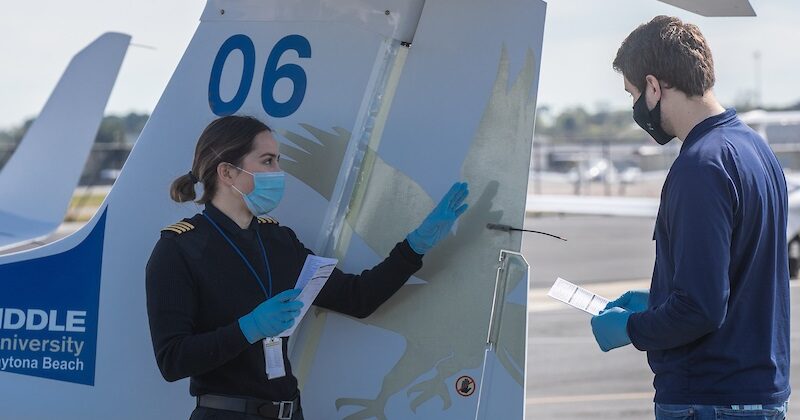Aviation should ‘remedy bias facing aspiring female and minority commercial pilots’

Flight Instructor Anna Battison does a Preflight check on the flight line of a DA42 with student pilot Dawson Schriner at Embry-Riddle Aeronautical University, in Daytona Beach, December 20, 2020. (Embry-Riddle/David Massey)
The aviation industry should remedy the bias facing aspiring female and minority commercial pilots, both in flight training and employment opportunities, according to researchers at Embry-Riddle Aeronautical University in Florida.
Consumers and even other pilots respond more favourably to white male pilots compared with female and minority pilots, revealed their research. The report concluded: “Potential employees are often unintentionally under-evaluated due to biases, and specific groups could be unfairly kept out of the cockpit and better candidates excluded.”
The most valuable part of the research lay in demonstrating that implicit, or unconscious, biases exist, said Embry-Riddle PhD student Nadine Ragbir, the lead author of the paper. “Ignoring these biases may lead to consequences such as low retention rates, pilot shortages and lack of diversity due to under hiring of women and minorities,” Ragbir told Corporate Jet Investor.
“If such biases continue to persist in business aviation, then they overlook the value and talent in the differences that women and minorities offer and shut down the path for change and growth.” While some people know they are biased or prejudiced against an individual, others may be unaware. “Just being able to make people aware that there are unconscious biases that could influence their thoughts and actions is a step forward,” Ragbir added.
Stephen Rice, professor of human factors and co-author, said the research had significant implications for recruitment policies. “The aviation industry needs to be aware that this bias exists because they need to make sure their hiring process is fair to women and minorities,” he said.
‘Whatever it takes to help women and minorities’
“They need to do whatever it takes to help women and minorities overcome these societal problems.”
Ragbir recommended aviation companies instituted diversity and inclusion programmes to ensure candidates were selected solely on merit, without gender or ethnicity tainting the selection procedures.
The researchers based their conclusions on scientific experiments, which involved showing photographs of female and male pilots of various races to participants. The participants were then asked to rate how well they thought the pilots would perform. Respondents consistently gave higher ratings to white male pilots.
Aviation could not afford to let bias rule out the very best candidates, said Rice.
Despite the pandemic, air travel is projected to expand over the coming years and with a large percentage of the industry’s workforce reaching retirement age, a shortage of aviation professionals is predicted, said Rice said. Selection on merit was key to make the most of the opportunities ahead.
Shortage of aviation professionals
Also bias should not be allowed to perpetuate through the generations. “Those pilots [now undergoing selection procedures] may be in positions of power one day to make hiring choices,” he said.
The report, ‘An examination of consumer bias against female and minority commercial pilots’, was published in the February 2021 edition of the journal Technology in Society.
Meanwhile, last July Pamela Williams, Human Relations director, Organization of Black Aerospace Professionals (OBAP) told Corporate Jet Investor’s Global 2020 online conference that business aviation needs “strategic planning and metrics”.
Williams said: “It has to be a strategic conversation in a board room and there has to be a strategic plan around it. How do we implement processes, plans and metrics to tell us we are really putting our money where our mouth is [on expanding ethnic diversity]?

Nadine Ragbir: On the drive to highlight bias in attitudes towards female and minority group pilots.








